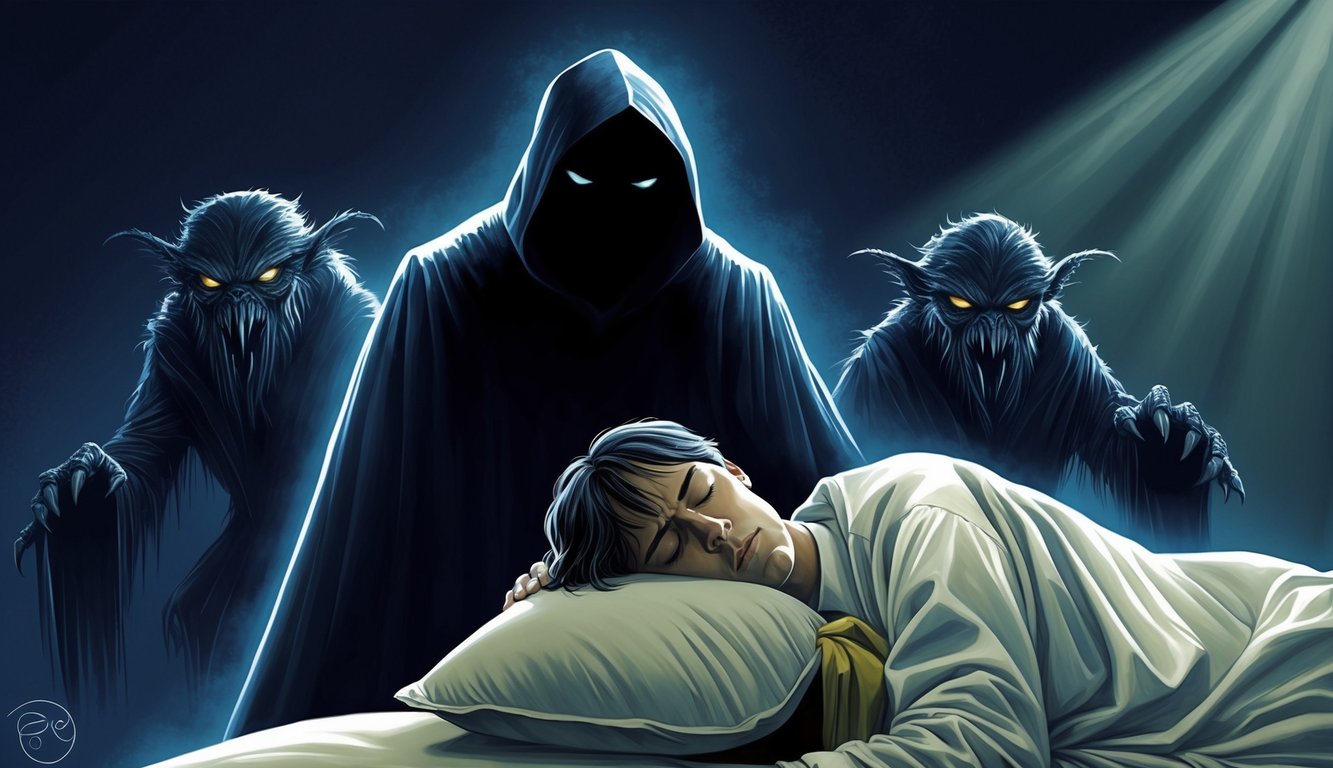Align Your Life with Your True North
The Power Quadrant System decodes your natural talents and pinpoints the career, timing and relationships that let you earn more, love deeper, and wake up eager for the day.
- Uncover your #1 high-income strength
- Draw in partners who raise your energy
- Work when your body’s clock is in “flow”
Dreams have long captivated our imagination, offering glimpses into our subconscious minds.
While you sleep, your brain weaves intricate stories that can reflect your deepest fears, desires, and unresolved issues. Common dream themes often carry symbolic meanings that can provide valuable insights into your waking life.
Have you ever found yourself falling endlessly or being chased by an unknown pursuer in your dreams? These scenarios, along with teeth falling out or showing up unprepared for an exam, are among the most frequently reported dream experiences.
Each of these themes can offer clues about your emotional state, current challenges, or personal growth opportunities.
Exploring the world of dream interpretation can be a fascinating journey of self-discovery.
By paying attention to recurring symbols and emotions in your dreams, you can gain a better understanding of your inner world.
Whether it’s a dream about flying, which might represent a desire for freedom, or one about being naked in public, possibly indicating vulnerability, your nighttime narratives can serve as a mirror to your waking thoughts and feelings.
Keeping a dream journal can help you identify patterns and recurring themes, making it easier to interpret their meanings.
For instance, a dream about climbing mountains might symbolize personal growth, ambition, or overcoming obstacles in your life.
By analyzing these dreams, you can gain valuable insights into your subconscious mind and use them to navigate your waking experiences more effectively.
Key Takeaways
- Dreams often reflect your subconscious mind and can offer insights into your emotions and experiences
- Common dream themes like falling, being chased, or losing teeth may symbolize specific concerns or feelings in your waking life
- Analyzing your dreams can lead to greater self-awareness and personal growth
Exploring the Subconscious
Dreams offer a unique window into your subconscious mind.
Decode Your Personal Success Blueprint
Power Quadrant System shows you the exact career, relationships, and daily rhythm that match your natural DNA—so you earn more, work happier, and connect deeper.
- Pinpoint your #1 money-making talent
- Erase conflict & attract ideal partners
- Multiply productivity with perfect timing
They reveal hidden thoughts, emotions, and desires that may not be apparent in your waking life.
Your unconscious mind plays a crucial role in shaping these nocturnal narratives.
The Role of the Unconscious Mind
Your unconscious mind is like a vast storehouse of memories, experiences, and repressed emotions.
It influences your thoughts and behaviors without you even realizing it.
During sleep, this part of your mind becomes more active, weaving together seemingly random elements to create vivid dreamscapes.
Dreams can provide personal insight into your deepest fears, wishes, and unresolved conflicts.
You might find yourself facing situations that reflect your waking life challenges or exploring fantastical scenarios that symbolize your innermost desires.
By paying attention to recurring themes in your dreams, you can gain valuable self-knowledge.
These patterns often point to areas of your life that need attention or issues you’ve been avoiding.
Tap Into Your Built-In Success GPS
The Power Quadrant System deciphers your genetic blueprint so you can lock onto the career, income and relationships that feel effortless—and wildly rewarding.
- Zero in on your natural high-earning genius
- Sync with partners who boost your vibe
- Wake up driven, finish days fulfilled
Your subconscious uses symbols and metaphors to communicate complex ideas.
A falling dream, for instance, might represent feelings of insecurity or loss of control in your waking life.
Understanding these hidden messages can help you:
- Identify sources of stress or anxiety
- Uncover repressed emotions
- Gain clarity on personal goals and aspirations
- Improve self-awareness and emotional well-being
Common Dreams and Their Interpretations
Dreams often reflect our subconscious thoughts and emotions.
Two frequent dream themes many people experience are being chased and falling.
These can reveal insights about your waking life concerns and fears.
Dreams of Being Chased
You’re running, heart pounding, as an unknown pursuer closes in.
This common dream may signify you’re avoiding a problem or fear in your waking life.
The chaser represents an issue you need to confront.
Pay attention to who or what is chasing you.
An animal could symbolize repressed anger or passion.
An unknown figure might point to unresolved childhood experiences or past trauma.
These dreams encourage you to face your fears head-on.
Consider what you’re running from in real life.
Are you avoiding a difficult conversation or decision? Identifying the source can help you address it while awake.
Falling Dreams
You’re plummeting through the air, jolting awake just before impact.
Falling dreams often relate to feelings of insecurity or loss of control in your life.
These dreams may occur when you’re overwhelmed or anxious about a situation.
Perhaps you’re facing a big change at work or in a relationship.
The sensation of falling reflects your fear of failure or uncertainty about the future.
Falling dreams can also symbolize letting go of something.
You might be releasing old beliefs or habits that no longer serve you.
While scary, these dreams can signal personal growth and transformation.
To ease falling dreams, focus on areas where you feel unstable in life.
Building confidence and taking small steps toward your goals can help you regain a sense of control.
Symbols in Dreams
Dreams often contain powerful symbols that can offer insight into our subconscious minds.
These symbols may represent deep-seated emotions, fears, or desires that we’re not fully aware of in our waking lives.
Teeth and Anxiety
Have you ever dreamed your teeth were falling out? This common dream symbol often relates to feelings of anxiety or insecurity.
It might reflect worries about your appearance or concerns about losing power or control in your life.
Sometimes, it can signify a fear of aging or a sense of vulnerability.
Teeth dreams may also point to communication issues.
Are you holding back from expressing yourself? Or perhaps you’re worried about saying the wrong thing? Pay attention to the context of your dream – were your teeth crumbling, or did they fall out painlessly? These details can offer clues to the specific anxieties you’re dealing with.
Snakes and Transformation
Snakes in dreams can be particularly striking symbols.
While they might seem scary at first, they often represent positive transformation or healing.
Think about a snake shedding its skin – it’s a powerful image of renewal and growth.
Encountering a snake in your dream might indicate you’re going through a significant life change.
Are you facing a new challenge or entering a different phase of life? The snake could be urging you to embrace this transformation.
Sometimes, snake dreams relate to hidden fears or threats.
If the snake in your dream was aggressive, it might represent a person or situation you perceive as dangerous.
Pay attention to your feelings in the dream – were you afraid, or did you feel a sense of awe?
Psychology and Dream Analysis
Dream analysis offers insights into the subconscious mind.
Psychologists have long been fascinated by the hidden meanings behind our nocturnal visions.
Freud’s Perspectives
Sigmund Freud, the father of psychoanalysis, believed dreams were a window into your unconscious desires.
He saw them as manifestations of repressed emotions and unfulfilled wishes.
Freud argued that dream content often represented symbolic fulfillment of urges you might find unacceptable in waking life.
For example, dreaming of falling could signify feelings of insecurity or loss of control.
In Freudian dream analysis, you’d explore the latent content behind the manifest imagery.
This process might involve free association, where you share thoughts sparked by dream elements.
Freud’s theories emphasized sexual and aggressive impulses as key drivers of dream content.
While controversial, his ideas laid groundwork for modern dream research.
Today, many psychologists view dreams as reflections of your daily experiences and emotional states.
Your dreams may help process information and consolidate memories.
Emotional Themes in Dreams
Dreams often reflect our deepest emotions and psychological states.
They can reveal anxieties, insecurities, and hidden feelings that may not be apparent in our waking lives.
Anxiety and Change
Dreams about anxiety and change are incredibly common.
You might find yourself in situations where you’re unprepared for an important event or suddenly transported to an unfamiliar place.
These dreams often mirror your real-life concerns about upcoming changes or challenges.
Typical anxiety dreams include:
- Being late for an exam or important meeting
- Losing your teeth or hair
- Falling from a great height
- Being chased by an unknown pursuer
These scenarios reflect your subconscious worries about failure, loss of control, or facing unexpected obstacles.
They can serve as a reminder to address these concerns in your waking life.
Vulnerability and Exposure
Dreams of vulnerability often manifest as scenarios where you feel exposed or unprepared.
The classic “naked in public” dream is a prime example of this theme.
In these dreams, you might find yourself:
- Naked or underdressed in a crowded place
- Unable to find a private bathroom
- Suddenly realizing your clothes have disappeared
These dreams typically reflect feelings of insecurity or fear of judgment.
They may occur when you’re facing a situation where you feel vulnerable or exposed in your waking life, such as starting a new job or entering a new relationship.
Remember, these dreams are your mind’s way of processing emotions and experiences.
They’re not predictions or judgments, but rather reflections of your inner world.
Navigating Dream Content
Dreams about death and exams are common themes that many people experience.
These dreams often reflect our deepest fears and anxieties in waking life.
Dreams About Death
Death dreams can be unsettling, but they rarely predict actual deaths.
Instead, they often symbolize major life changes or transitions.
You might have these dreams when ending a relationship, changing careers, or moving to a new place.
Sometimes, death dreams represent your fear of the unknown or anxiety about aging.
They can also reflect unresolved grief or a need to let go of something in your life.
Pay attention to who dies in your dream.
If it’s you, it might indicate a desire for personal transformation.
If it’s someone else, consider your relationship with that person and what they represent to you.
Exam and Test-Taking Dreams
Exam dreams often pop up long after you’ve finished school.
They typically reflect feelings of being unprepared or tested in some area of your life.
You might have these dreams when facing a job interview, presentation, or other high-pressure situation.
They can also occur when you’re feeling judged or scrutinized by others.
Common scenarios include:
- Forgetting to study
- Arriving late to the exam
- Not being able to find the exam room
- Realizing you’re in the wrong class
These dreams often highlight your perfectionist tendencies or fear of failure.
They can be a sign that you’re putting too much pressure on yourself in your waking life.
To reduce exam dreams, try addressing your real-life stressors and practicing relaxation techniques before bed.
Unique Dream Scenarios
Dreams often take us on strange journeys through surreal landscapes of the mind.
These scenarios can reveal hidden aspects of ourselves or reflect major life changes.
Manifestations of Identity
Have you ever dreamed you were someone else entirely? These identity-shifting dreams can be both thrilling and unsettling.
You might find yourself in the body of a different gender, race, or even species.
Such dreams may reflect a desire to escape your current circumstances or explore different facets of your personality.
They can also signify a period of personal growth and transformation in your waking life.
Sometimes you might dream of having superpowers or special abilities.
Flying dreams are particularly common and often symbolize a sense of freedom or overcoming obstacles.
Dreams of Pregnancy
Pregnancy dreams happen surprisingly often, even for those who aren’t expecting.
If you’re not pregnant, these dreams might represent a new project or idea that’s “gestating” in your mind.
For expectant mothers, pregnancy dreams can reflect hopes and fears about impending parenthood.
You might dream of giving birth to animals or objects instead of babies, which can symbolize anxieties about the unknown aspects of becoming a parent.
Men can have pregnancy dreams too.
These might indicate a desire for creativity or nurturing new aspects of life.
Travel and Past Homes
Dreams of traveling often represent your life’s journey or desire for change.
You might find yourself in exotic locations or on endless roads, reflecting your aspirations or feelings of being directionless.
Dreaming of your childhood home or previous residences is also common.
These dreams can signify nostalgia or unresolved issues from your past.
You might discover new rooms in old houses, symbolizing unexplored aspects of yourself.
Sometimes these dreams blend the familiar with the strange.
Your old bedroom might be in a foreign country, or your current home might be filled with people from your past.
Phenomenology of Dreaming
Dreams are fascinating experiences that occur during sleep.
They can range from mundane to extraordinary, with some feeling incredibly real while others are hazy and disjointed.
Understanding Lucid Dreams
Lucid dreaming occurs when you become aware that you’re dreaming while still asleep.
In these dreams, you can often control your actions and surroundings.
Many people practice techniques to induce lucid dreams.
These include reality checks throughout the day or setting intentions before sleep.
Some also use meditation or visualization exercises to enhance their awareness in dreams.
Others explore guides on how to dream about someone, focusing on a specific person before sleep to increase the chances of seeing them in a dream.
Keeping a dream journal can also help by improving dream recall and recognizing patterns over time.
Lucid dreams can be vivid and feel incredibly real.
You might find yourself flying, exploring fantastical worlds, or confronting fears in a safe environment.
Some use lucid dreaming for problem-solving or creative inspiration.
The Vividness of Dreams
Dream vividness varies greatly from person to person and night to night.
Some dreams feel as real as waking life, with intense sensory experiences and emotions.
Others are more like faint impressions or fragmented scenes.
Vivid dreams often involve clear visual details, sounds, and even physical sensations.
You might remember tastes, smells, or textures upon waking.
These dreams can leave a lasting impression and may be easier to recall later.
Factors affecting dream vividness include sleep quality, stress levels, and certain medications.
Keeping a dream journal can help you notice patterns in your dream experiences and potentially increase dream recall.
Reflective Practice in Dream Work
Keeping a dream journal can enhance your understanding of your subconscious mind.
This practice allows you to remember and analyze your dreams, leading to valuable insights about yourself.
Keeping a Dream Journal
Start by placing a notebook and pen next to your bed.
As soon as you wake up, jot down any dream fragments you recall.
Don’t worry about perfect sentences – quick notes are fine.
Over time, you’ll likely notice patterns in your dreams.
Pay attention to recurring themes, emotions, or symbols.
These can offer clues about your inner world.
Try recording the date, time, and any notable events from the previous day.
This context can help you make connections between your waking life and dream experiences.
Reviewing your dream journal regularly can boost your dream recall.
You might start remembering more details and having more vivid dreams.
Use your journal for self-reflection.
Ask yourself what each dream might mean to you personally.
Trust your intuition – you’re the best interpreter of your own dreams.
Interpreting Nightmares
Nightmares can reveal hidden fears and anxieties.
They often reflect your waking life struggles and emotions in vivid, sometimes frightening ways.
School and Academic Stress
Dreams about being in school are common nightmare scenarios.
You might find yourself unprepared for an exam or unable to find your classroom.
These dreams can stem from your fear of failure or anxiety about change in your life.
You may dream about:
- Forgetting your locker combination
- Showing up to class naked
- Missing an important assignment
These scenarios reflect feelings of vulnerability and unpreparedness.
If you’re no longer in school, these dreams might represent challenges in your career or personal life where you feel tested or judged.
Creatures and Conflict
Nightmares involving creatures or conflict often symbolize internal struggles.
Dreams about spiders, for example, can represent feelings of being trapped or overwhelmed.
You might encounter:
- Giant spiders chasing you
- Monsters hiding under your bed
- Faceless figures following you
These images can be your mind’s way of processing fear or stress.
Spiders in dreams might indicate you feel entangled in a complex situation.
Conflict scenarios could reflect unresolved issues in your relationships or work life.
Remember, nightmares are a normal part of sleep.
They don’t predict the future but can offer insights into your emotional state.
Frequently Asked Questions
Dreams often feature recurring themes and scenarios that can offer insights into our subconscious minds.
These common dream motifs may reflect our fears, desires, and life experiences.
What are the top dreams people often have and what could they signify?
You might find yourself experiencing dreams of falling, being chased, or flying.
Falling dreams could represent feelings of insecurity or loss of control in your waking life.
Chase dreams may indicate you’re avoiding a person or issue.
Flying dreams often symbolize freedom, success, or a desire to escape your current circumstances.
Can you list several recurring dream scenarios and their potential interpretations?
Dreams about being unprepared for an exam could reflect anxiety about performance or fear of failure.
Losing teeth in a dream might suggest concerns about your appearance or communication skills.
Dreams of being naked in public may point to feelings of vulnerability or fear of exposure.
What might some of the familiar dream motifs suggest about our subconscious?
Water in dreams can symbolize emotions or the unconscious mind.
Large waves might represent overwhelming feelings.
Dreaming of a house often reflects different aspects of yourself, with each room potentially representing different parts of your personality or life.
Are there typical stories that unfold in dreams, and what might they mean?
You might dream of missing a train or plane, which could indicate missed opportunities or fear of change.
Dreams of being unable to find a bathroom may suggest you’re neglecting your personal needs.
Showing up late to an important event in a dream could reflect anxiety about time management or fear of disappointing others.
What is the most frequently experienced dream and its proposed meaning?
Being chased is one of the most common dream themes.
This dream may represent avoidance of a person, problem, or fear in your waking life.
The nature of the pursuer can offer additional insights.
An animal chasing you might symbolize repressed instincts or emotions.
How might researchers explain the common storylines that appear in our dreams?
Dream researchers suggest that common dream themes may reflect universal human experiences and concerns.
Your brain might use familiar scenarios to process emotions and experiences from your daily life.
Cultural factors can also influence dream content, explaining some variations in dream themes across different societies.










